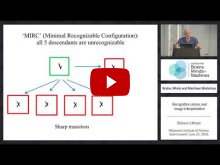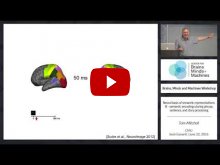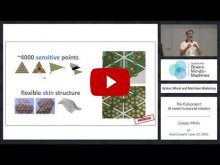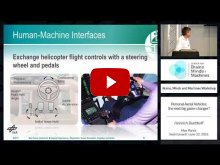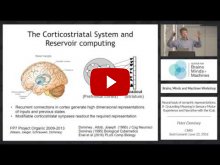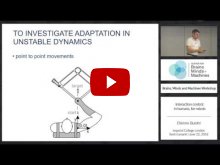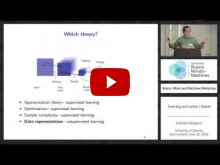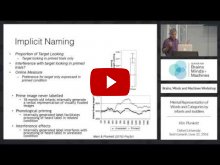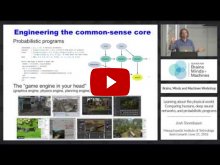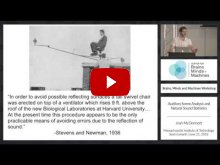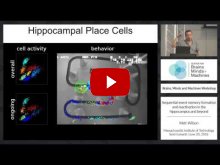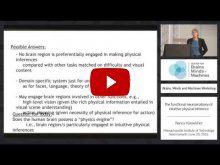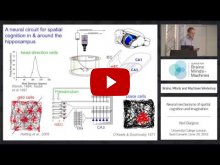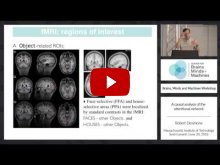Brains, Minds and Machines Workshop in Sestri Levante, Italy, June 20-22, 2016

The Center for Brains, Minds and Machines, the Italian Institute for Technology, and the Max Planck Institute for Biological Cybernetics are organizing a workshop on the science and engineering of intelligence on June 20-22, 2016 in Sestri Levante, Italy. For three days -- one day for each of the Brains, Minds, and Machines areas -- we will bring together computer scientists/roboticists, cognitive scientists, and neuroscientists to share and discuss advances in integrated, multimodal approaches to the study of human intelligence.
Organizers: Boris Katz (MIT), Giorgio Metta (Istituto Italiano di Tecnologia) and Lorenzo Rosasco (University of Genova)
Local Organizer: Fabio Anselmi (Istituto Italiano di Tecnologia)
Steering Committee: Tomaso Poggio (MIT), Kenneth Blum (Harvard), Heinrich H. Bülthoff (Max Planck), Tony Prescott (University of Sheffield), Josh Tenenbaum (MIT)
Location: Fondazione Mediaterraneo, 14 Via Portobello, Sestri Levante, GE 16039
CBMM Mission:
The mission of CBMM is to make progress on the greatest problem in science — human intelligence. A new field is emerging dedicated to developing a computationally centered understanding of human intelligence and to establishing an engineering practice based on that understanding. CBMM’s long-term goals are to uncover basic principles of intelligence, both natural and artificial, and the mechanisms that can be used to implement intelligent systems, both by brains and in silicon. For the past several years, the Center for Brains, Minds, and Machines has been pursuing this goal and is now bringing the discussion to the European research community.
As robots develop further and our lives are increasingly intertwined with machines and algorithms, understanding intelligence is becoming a crucial problem. Without this understanding, machines won’t be able to adapt to new problems, recover from errors, and learn similarly to the way humans do. But the brain is too complex to simply inspect it and understand how it works. We have to develop hypotheses and test them, and this requires models of intelligence which can benefit tremendously from machines that solve similar tasks. Neuroscience and engineering are tied together by new developments in cognitive science that characterize the concepts and algorithms that humans use. By promoting close collaborations between these domains of research, we will significantly advance our understanding of brains, minds, and machines.

Download the Preliminary Schedule (PDF)
Preliminary Schedule
Day 1 |
Brains |
| 9:30am-10am | Robert Desimone, MIT |
| “A causal analysis of the attentional network” | |
| 10am-10:30am | Neil Burgess, University College London |
| “Neural mechanisms of spatial cognition and imagination” | |
| 10:30am-11am | break |
| 11am-11:30am | Nancy Kanwisher, MIT |
| “The functional neuroanatomy of intuitive physical inference” | |
| 11:30am-12pm | Gabriel Kreiman, Harvard Medical School |
| “On biologically plausible mechanisms for pattern completion” | |
| 12noon-3pm | lunch |
| 3pm-3:30pm | Jocelyne Ventre-Dominey, Inserm-U846 Lyon |
| “Neural basis of semantic representation: I- Human neuroscience” | |
| 3:30pm-4pm | Winrich Freiwald, Rockefeller University |
| “From face perception to social cognition: a neural circuits approach” | |
| 4pm-4:30pm | Matt Wilson, MIT |
| “Sequential event memory formation and reactivation in the hippocampus and beyond” | |
Day 2 |
Minds |
| 9:30am-10am | Josh McDermott, MIT |
| “Auditory Scene Analysis and Natural Sound Statistics” | |
| 10am-10:30am | Emmanuel Dupoux, EHESS, Paris |
| "Language acquisition by infant and machines" | |
| 10:30am-11am | break |
| 11am-11:30am | Laura Schulz, MIT |
| “Outside in: Formal and informal approaches to understanding how children connect behavioral observations to their underlying causes” | |
| 11:30am-12pm | Merideth Gattis, Cardiff |
| “The Active Child” | |
| 12noon-3pm | lunch |
| 3pm-3:30pm | Josh Tenenbaum, MIT |
| “Learning about the physical world: Comparing humans, deep neural networks, and probabilistic programs” | |
| 3:30pm-4pm | Tony Prescott, U Sheffield |
| “Autobiographical memory in humans and machines” | |
| 4pm-4:30pm | break |
| 4:30pm-5pm | Shimon Ullman, Weizmann Institute of Science |
| “Recognition atoms and image interpretation” | |
| 5pm-5:30pm | Kim Plunkett, Oxford |
| "Mental Representation of Words and Categories by infants and toddlers" | |
Day 3 |
Machines |
| 9:30am-10am | Tomaso Poggio, MIT |
| “A theoretical framework for Deep Learning networks” | |
| 10am-10:30am | Lorenzo Rosasco, University of Genova |
| “Learning and cortex: i-theory” | |
| 10:30am-11am | break |
| 11am-11:30am | Etienne Burdet, Imperial College London |
| “Interaction control: in humans, for robots” | |
| 11:30am-12pm | Boris Katz, MIT |
| "Using language to understand vision and vision to understand language" | |
| 12noon-3pm | lunch |
| 3pm-3:30pm | Peter Dominey, CNRS |
| “Neural basis of semantic representations: II- Grounding Meaning in Sensory-Motor Experience and Narrative with the iCub” | |
| 3:30pm-4pm | Giorgio Metta, IIT |
| “The iCub project: AI meets humanoid robotics” | |
| 4pm-4:30pm | break |
| 4:30pm-5pm | Heinrich Buelthoff, Max Planck |
| “Personal Aerial Vehicles: the next big game-changer?” | |
| 5pm-5:30pm | Tom Mitchell, CMU |
| "Neural basis of semantic representations: III - semantic encodings during phrase, sentence, and story processing" |
Participants:
Etienne Burdet, Imperial College London
Neil Burgess, UCL Institute of Cognitive Neuroscience
Heinrich Bülthoff, Max Planck Institute for Biological Cybernetics, Tübingen
Robert Desimone, McGovern Institute for Brain Research at MIT
Peter F. Dominey, Centre National de la Recherche Scientifique, Lyon
Emmanuel Dupoux, École des Hautes Etudes en Sciences Sociales, Paris
Winrich Freiwald, Rockefeller Unversity
Meredith Gattis, Cardiff University
Nancy Kanwisher, Massachusetts Institute of Technology
Boris Katz, Massachusetts Institute of Technology
Gabriel Kreiman, Children's Hospital Boston, Harvard Medical School
Josh McDermott, Massachusetts Institute of Technology
Giorgio Metta, Istituto Italiano di Tecnologia
Tom Mitchell, Carnegie Mellon University
Kim Plunkett, University of Oxford
Tomaso Poggio, Massachusetts Institute of Technology
Tony Prescott, University of Sheffield
Lorenzo Rosasco, Istituto Italiano di Tecnologia, Università degli Studi di Genova
Laura Schultz, Massachusetts Institute of Technology
Joshua Tenenbaum, Massachusetts Institute of Technology
Shimon Ullman, MIT, Weizmann Institute of Science
Matt Wilson, Massachusetts Institute of Technology
Jocelyne Ventre-Dominey, Inserm-U846, Lyon

 LEARNING
LEARNING
